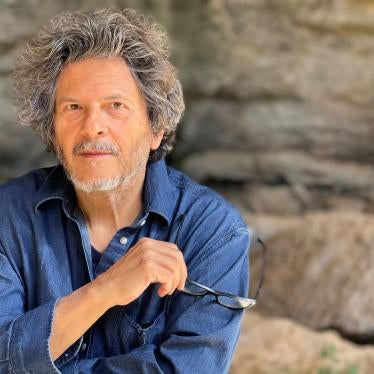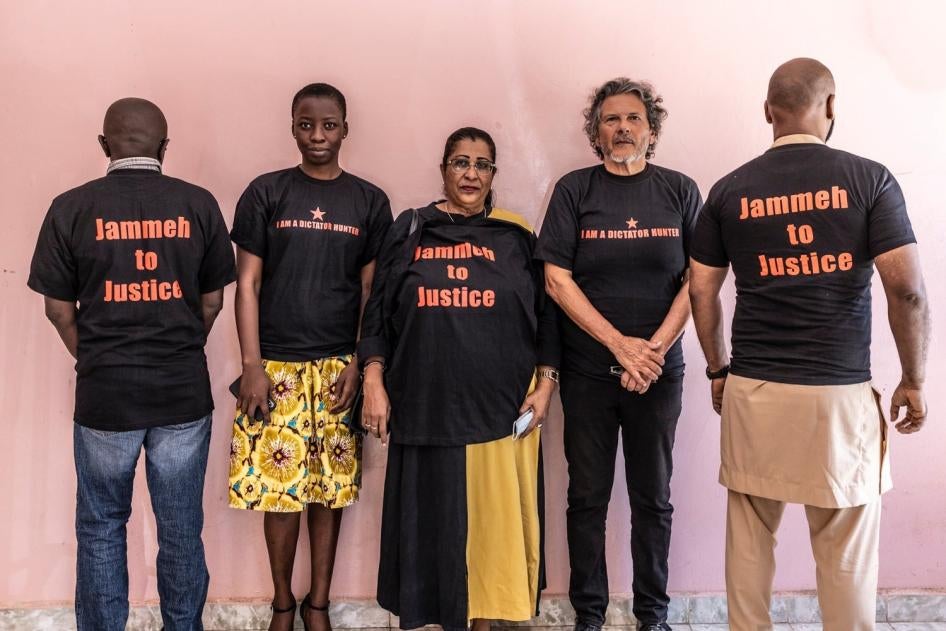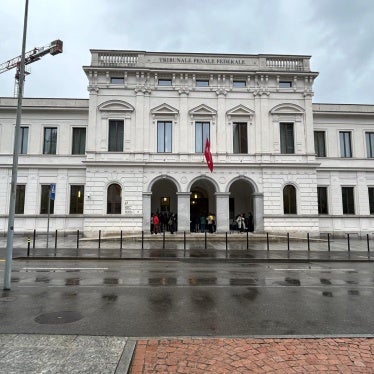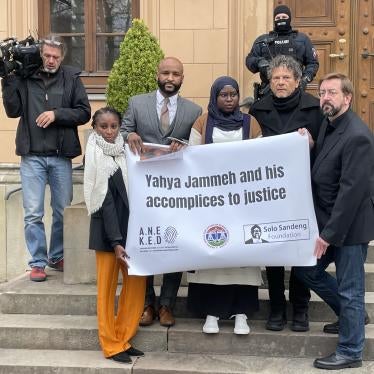You are nicknamed the ‘Dictator Hunter’ thanks to your past three decades of pursuing dictators for atrocities and seeking justice for their victims. Could you explain to us exactly how that works?
‘Dictator Hunter’ is a great calling-card, but it doesn’t reflect the constructive and serious work I try to do alongside atrocity victims and activists to help them develop the legal and political conditions to get justice for themselves. That involves strategizing, training, fund-raising, building the evidentiary case, gathering support from allies, and persuading reluctant officials that it is not in their interest to stand in the way of the victims. It’s really about helping victims themselves become ‘Dictator Hunters.’ No one is going to be moved to prosecute Yahya Jammeh- or Augusto Pinochet or Hissène Habré- because of what Reed Brody from New York says, but because Baba Hydara, Ayesha Jammeh, Fatoumatta Sandeng and Nana-Jo Ndow show that they deserve justice for what Jammeh did to their fathers.
Would you liken former president Jammeh to former Chadian dictator Habre? What did the two have in common?
Not really. They are united by a cruelty and a desire to keep power by any means. Beyond that, they are very different. Habré went to elite schools in France, thought in geopolitical terms, and gave fiery revolutionary speeches (although he was installed in power by the CIA). Jammeh was more intuitive, I think. And some things that Jammeh came up with, like the disastrous presidential AIDS-treatment program, and the witch-hunts, are pretty unique to him.
In October 2017, victims of Jammeh with your assistance announced the launch of an “international campaign” to bring Jammeh to justice. Four years on, that is yet to happen. What is the progress in the quest for justice for Jammeh’s victims?
So much has already happened. Jammeh’s victims are a powerful and visible force, whose stories are now familiar. Organizations like the Victims’ Center, ANEKED and WAVE are giving voice to the demand for justice. Even in Ghana, there is a “Jammeh2Justice” coalition which is forcing the government to act on behalf of their 44 migrants killed. The Nigerian migrant’s brother who testified at the TRRC last month is now back home clamoring each day for Nigeria to get involved. And thanks mostly to the amazing work of the TRRC, but also to NGOs like TRIAL International and Human Rights Watch, everyone now knows about the crimes of the Jammeh period. There have been national and even regional discussions on how to prosecute the worst offenders from that period once the TRRC makes its recommendations.
Despite your well-known reputation of brining dictators to justice, the case of Jammeh has proven so far elusive for you in particular, and since justice delayed is justice denied, what do you tell his victims?
For a victim whose father was killed, who was raped or left crippled, every day without justice is like an additional torture. The government decided to hold off prosecutions until after the TRRC, which frustrates many victims, but July 2021 is when the TRRC reports and things really get started. The TRRC will certainly recommend that Jammeh and others be held accountable. Then it will be up to the government to seek Jammeh’s extradition and trial.
Let’s talk about the political will. The inception of the Barrow administration engendered a lot of enthusiasm for change, but he has since reverted to hiring former Jammeh acolytes. What’s your take on the Barrow regime and do you think his hiring trajectory bodes well for your fight for justice as Barrow dances with the same people who enabled Jammeh to commit those crimes?
It’s really not my place to comment on Gambian politics, other than to express concern that the government has brought in a number of officials credibly accused of abuses under Jammeh.
What would you advise them to do from here?
Immediately publish, disseminate, and begin to implement the recommendations of the TRRC, especially those on reparations, on institutional and legal reforms, and on who should be prosecuted. The victims and civil society will be making an issue of the TRRC recommendations in the upcoming elections, asking each of the candidates and parties to commit to putting the TRRC’s recommendations into practice.
In the recent past, there has been talk of Jammeh’s “imminent return” to the Gambia by supporters of his party, is there any possibility of that ever happening, given the TRRC revelations?
In January 2020, when Jammeh’s possible return was first raised, there was a huge outcry from the victims. Nineteen national and international NGOs wrote an open letter to the African Union and ECOWAS. Justice minister Ba Tambadou said that Jammeh would face immediate arrest if he came back. I believe that is still the position of the government.
And do you also feel like the Habré case, you are going to need luck with Jammeh?
The luck in the Habré case was that he stayed alive, and that Macky Sall defeated president Wade, who was protecting him. But you also create your own luck – during their countless visits to Senegal, the Chadian victims had met Macky Sall when he was in the opposition. He listened to them and promised them justice if he came to power. We’d be very lucky – not to mention to people of Equatorial Guinea! – if democracy came to that country.
Your campaign is demanding Jammeh be extradited to the Gambia to face trial, wouldn’t that be daring considering the fact that the former president still has a lot of supporters in the country and the fragile security situation as we transition?
Of course, that’s a real concern. A trial doesn’t necessarily have to take place in The Gambia, though. One possibility that many are advocating is a hybrid court – like the one between Senegal and the African Union which tried Habré in Dakar. This could be a court between The Gambia and the AU or ECOWAS. A court which has its seat and most trials in The Gambia but for a Jammeh trial could sit elsewhere in the region.
In one of your media interviews, you said the rape and sexual assault allegations against Jammeh will make it harder for Equatorial Guinea to refuse to hand him over for trial when the time comes. Isn’t that time now?
The time is coming after the TRRC makes its recommendations. I don’t expect that President Obiang of Equatorial Guinea will be keen to hand Jammeh over, he said he would “protect” Jammeh and we even saw them dancing together. But if The Gambia and all the other countries whose citizens were allegedly killed by Jammeh – countries like Nigeria, Ghana and Senegal – support his trial, I don’t think Obiang would want to stand in the way.
You publicly and loudly backed Toufah Jallow’s allegation that she was raped by Jammeh when many especially Jammeh sympathisers doubted her, what was the basis of your conviction?
Toufah is very credible. After we interviewed her, we checked out her story with multiple people with whom Toufah interacted right after the incident. When she fled to Senegal a few days after, she told her story to the United Nations, Amnesty International, Article 19 and the Canadian authorities. They all have records of her account. We spoke to her family and to those who helped her escape. What Toufah said to us is what she described back then, days after the event. Toufah’s account also matched the experiences of the other women we interviewed (“Anta” and “Bintu,” in our report) who she didn’t know then. In each case, it was the same driver who picked them up; it was Jammeh’s cousin Jimbee who befriended them, phoned them, had them brought to State House, took them to Jammeh, and stayed with them and the president in his room before leaving them alone. We also interviewed a number of Jammeh’s former aides, men who worked for the Protocol Department at State House; close protection officers; a former senior NIA official, among others. These insiders described Jammeh’s “system,” and showed us that the stories of Toufah, “Anta” and “Bintu” were not isolated cases.
With the recent revelations at the TRRC, how confident are you now that a case can be built against Jammeh?
The TRRC, which has done stellar work, HAS built the case. We have heard credible testimony that Jammeh ordered the killing of political opponents and the “witch hunts,“ that he participated in the rape and sexual assault of women, that he forced HIV-positive Gambians to give up their medicine. Most recently we have heard strong evidence that he ordered the killing of up to 59 West African migrants and then orchestrated a cover-up.
I hope Gambians appreciate how extraordinary the work of the TRRC has been, both in terms of getting evidence, especially from perpetrators, and of revealing on television the terrible things that went on under Jammeh.
APRC leader FTJ has always been saying that only Jammeh himself can decide when to return to The Gambia and that nothing can stop his return, do you see that happening and what do you think will happen if Jammeh decides to come back now?
If he comes back, he would have to be arrested and charged.
Any last words?
It’s a great privilege for me to work with Jammeh’s victims who have harnessed their suffering into a quest for justice. I’m inspired by the courage of Toufah Jallow, the determination of Ya Mamie Ceesay, the quest of Martin Kyere, the sole survivor of the migrant massacre. Last week at the TRRC, Lamin Sise said that Martin was “like the proverbial prophet, who travelled over land and sea to tell mankind what happened.” They are the real “Dictator Hunters.”










